Podcast: Play in new window | Download
Subscribe: Google Podcasts | Spotify | RSS
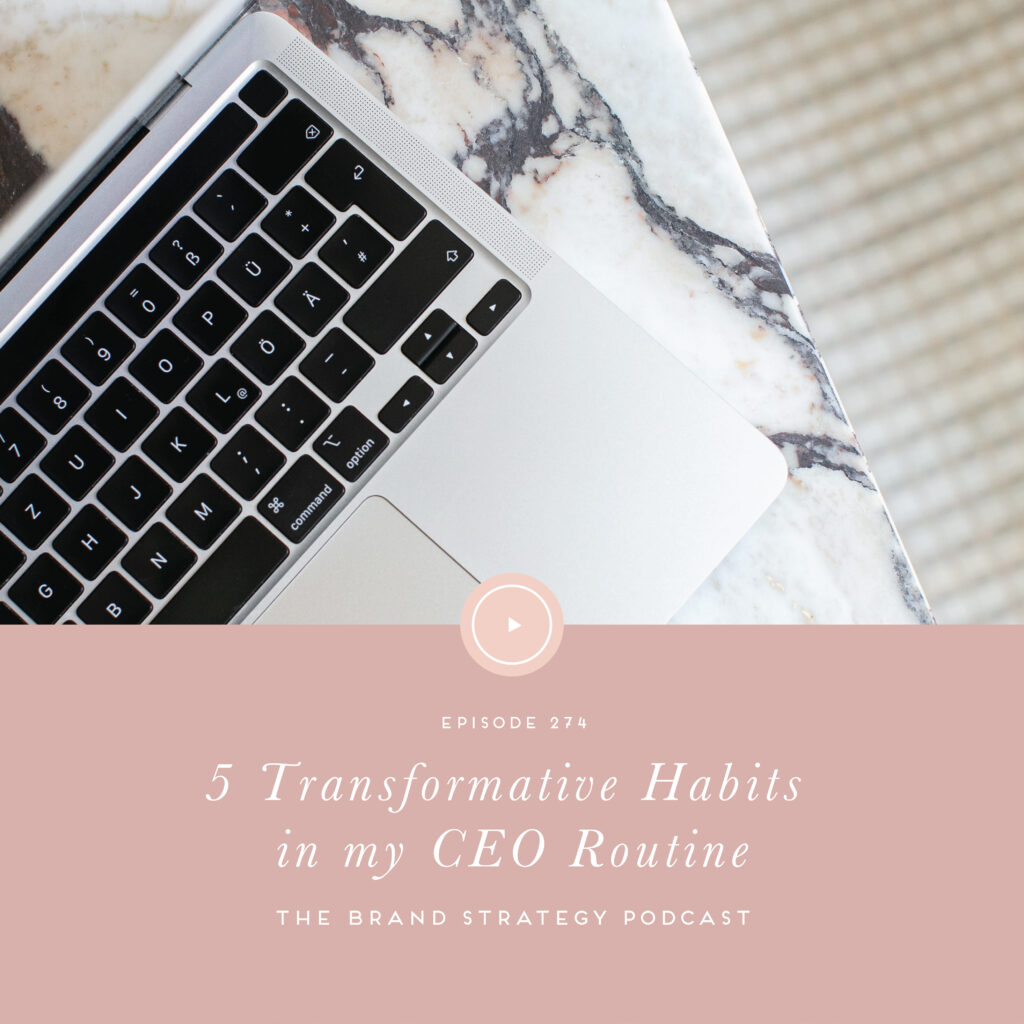
In today’s episode of the podcast, I’m sharing 5 transformative habits that have shaped the way I show up as a CEO in my creative, service-based business. These practices range from daily to weekly habits I implement in order to not only grow my business with intention, but in order to cultivate personal growth, as well.
As with everything I share here on the podcast, these ideas are meant to encourage and spark ideas of your own! They aren’t a one-size-fits-all solution, and aren’t meant to be just another thing you add to your ever-growing to-do list. Take whatever resonates with you and leave what doesn’t.
Tune in for the full episode above!
YOU MIGHT ALSO LIKE…
Creating clarity around your definition of success
How to step into the role of CEO in your business
Navigating change in your business
FOLLOW ALONG
LIKE THE SHOW?
IN ORDER TO PROVIDE CONTENT YOU LOVE I WANT TO HEAR FROM YOU! SUBSCRIBE TO THE BRAND STRATEGY PODCAST AND LEAVE A 5-STAR REVIEW HERE. THE MORE REVIEWS, THE MORE I’M ABLE TO PROVIDE THIS FREE-ACTIONABLE CONTENT!
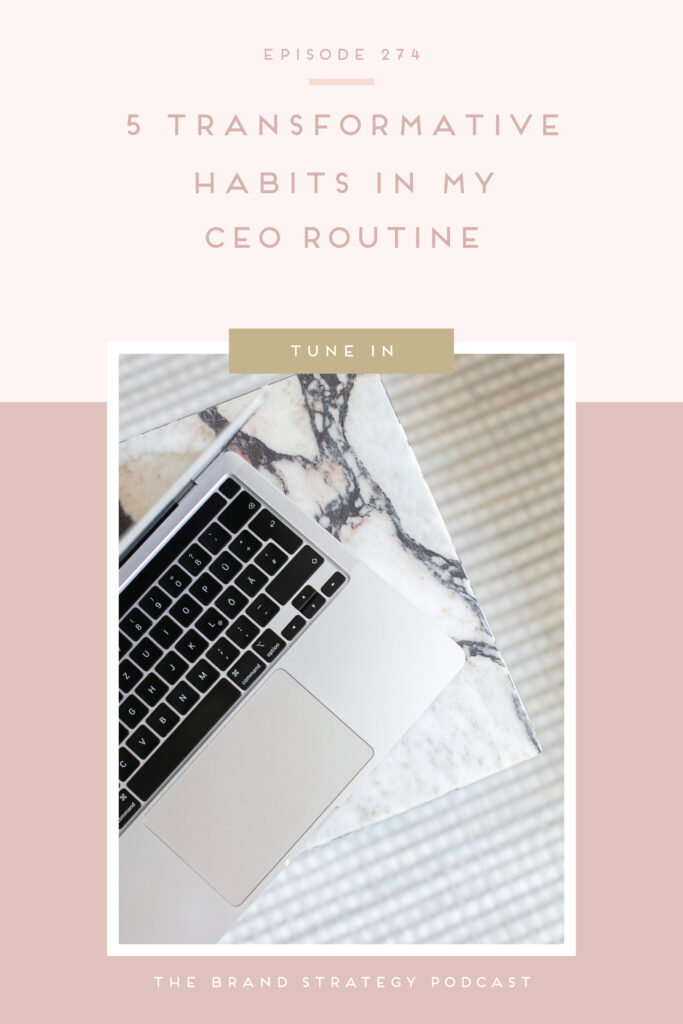
REVIEW THE TRANSCRIPT:
Please note this transcript has been auto generated and may contain typos.
Bonnie (00:07):
Hi, friend, and welcome to the Brand Strategy Podcast, a show created to equip you with the inspiration, encouragement, and clarity you need to build a brand of your dreams. I’m your host, Bonnie Bakhtiari, brand designer, strategist, and founder of the illume retreat. From sustainable Strategy to heartfelt Encouragement. Each episode is designed to equip you with the tools you need to chase after your dreams, because you deserve a brand that empowers you to do what you love, connects with your dream clients, and offers a deep sense of fulfillment along the way. So grab a cup of coffee and join me on this journey, won’t you? Hey, friends. Welcome back to the Brand Strategy Podcast, where today I am sharing five simple transformative habits that over time have really changed my business. This is something that I’m excited to share because I believe that it’s not necessarily these like grand, huge actions that we take that end up moving the needle forward for us in our lives or in our businesses.
Bonnie (01:10):
Instead, I think that a lot of the personal success or professional success that we can experience might end up being the result of small, seemingly insignificant actions that we take consistently and repetitively over time. And that’s really where that magic starts to happen. Now, as with most of what I share here on the podcast, this is just personal lived experience. This is not meant to be, you know, one size fits all, and this is not meant to be stuff that you must then go forth and like instantly implement into your life or the way that you’re running your business. Like, you know, if, if I’m sharing something and it resonates, that’s amazing, but it, you know, whatever doesn’t resonate, just leave it for later or maybe never. All that being said, I am diving into a series of transformations really, that have over time helped me experience more fulfillment and joy in my business, and also experience more fulfillment and joy in my life.
Bonnie (02:11):
And ultimately, isn’t that what it’s about? It’s not necessarily about finding ways, for me at least, to be the most profit-driven c e o. It’s not necessarily about ways to be the best at business or to, uh, you know, really reach for any of those things. Not that those are bad goals, per se, but those are goals that when I look back at the end of my career and I look back at the end of my life, I know they’re really not gonna matter to me. So instead of pursuing habits that are, you know, propelling me towards a definition of success that doesn’t actually align, I’m really only interested at this point in my life, in taking steps and implementing actions on a recurring basis that do align with how I define success and do align with the quality of life that I wanna live.
Bonnie (03:05):
So, um, each of these little habits that I’m gonna share really are, are born from that place. They were kind of shaped from that. So, thought further ado, let’s get into it. Now. It’s worth saying that habits and kind of these recurring actions in everyone’s life, they look different. Again, this is, you know, not one size fits all. This is not something that is meant to be one size fits all. This is meant to be really just a kind of a little snapshot into some of the recurring practices that I have found over the years to be helpful and transformative. So with that being said, these are things that I do on a recurring basis. Now that frequency might change. Uh, these are, you know, some of these things I do every day, some of them I do every week. Um, and so I find that as with a lot of things approaching, implementing any kind of changes into your routine, it’s, it’s better to really tackle that, like an experiment kind of play with it.
Bonnie (04:11):
Uh, as a recovering perfectionist, I oftentimes have tried to implement like, big changes in my life or my business by like believing that if I just can focus on the best routine or the most, like, you know, play by play, minute by minute, even kind of schedule, I can, I don’t know, perceive that I’ll have made it . And I know that sounds ridiculous, but, um, I, I can’t tell you how much time over my 11 year career I have, you know, tried to make like big sweeping changes. So these changes that I have found success with surprised me in the sense that they were not like these big kind of overnight shifts. They were small, repetitive, and in some cases almost boring practices that I really started to stick with, and that’s where I saw stuff start to happen. Okay? So the first thing that I started doing, I started creating recurring money dates with myself.
Bonnie (05:18):
Now, this is something that you’ve definitely heard me talk about here on the podcast before, and it’s because wow, this has been incredibly powerful for me. Um, I, I am a completely self-taught entrepreneur, and so I don’t have a really strong background in finance. I don’t have a really strong background in business management. And you know, I’m not ashamed to admit that in the earlier years of my business, I kind of had my head buried in the sand when it came to my business finances. Like, I would look at it every now and then, I’d, you know, kind of do that thing where like, you check in to make sure that you’ve got like enough to pay your taxes or you can afford this investment that you wanna, um, you know, expense. But it wasn’t something that I was like regularly checking in with. So I knew that that needed to change.
Bonnie (06:09):
I believe that what we focus on is where our attention can go and what we focus on is what grows in some cases. So I, I started focusing on, this was years ago. I started making this like a recurring weekly thing where it was, you know, I made the kind of this like fun, joyful practice where I’d, you know, make myself a cup of coffee or laid a candle or, you know, like put on some kind of like fun music in the background. And I’d pull up all my accounts and I would just look at where my money was. And this is a practice of looking at what money came in, what money went out, how did I feel about those exchanges of energy, how did I feel about where the business spent money and how did I feel about how the business acquired money, like made money, and were there any things that, you know, I wanted to do differently.
Bonnie (07:05):
Um, in some cases, you know, checking in with your finances, you can find, oh, I actually, you know, that was a recurring subscription that I needed to cancel and I forgot, you know, seeing that charge in my account, okay, that reminds me I need to, you know, do that now and free up those resources for something else. It also is a great time for me to look at, um, you know, projected revenue that’s coming in, so clients that I, uh, you know, have pending contracts with or sales from the brand strategy school that I expect to be coming through and that can help me plan for bigger investments or, uh, you know, understand in different seasons kind of as a snapshot what sort of take home pay I’m looking at. So having that as a recurring weekly process has really just made me feel a lot more, um, aware.
Bonnie (07:59):
It has made me feel more on top of things and more, uh, honestly, like, like a A A C E O where I know where my money’s going, I know how it’s being spent, I know how it’s coming in, and I’m able to remove a lot of the emotion that we can tie in with, you know, making money and spending money. And instead of looking at it as this, you know, kind of like, uh, this thing to be afraid of or this thing to be nervous about. I look at it as what it is, and it is just data. It’s just information. And so I’m able to take the emotion out of it and make decisions based on fact instead of feeling in this instance. Okay, the second thing that’s been really powerful, having a recurring daily c e o morning routine, morning routines. I know it’s one of those things that we see everybody talking about, you know, this is my like miracle morning routine.
Bonnie (08:57):
This is, you know, like the 10 steps that I do every day to, you know, like start my day off with success. And for those of us who, you know, find the morning routine to be helpful, it is something that I have really loved experimenting with over the years. And, you know, again, with every morning routine, every person’s morning looks different. So the morning might be a really busy time of getting everybody out the door, making sure that little ones have lunch, making sure that partners are getting where they need to go. And so it could be that the morning routine for you is a bit more truncated, it’s shorter, it’s more concise, it’s more compact. Um, you know, there have been seasons in my business where my morning routine has been really like long and luxurious and expansive, and there have been times where it’s, you know, been like short and sweet, and there’s really no right or wrong.
Bonnie (09:53):
It’s just what works better for you and, and what is realistic with the time and energy that you have available or that you want to devote to it. But kind of a little snapshot of what I’m currently implementing with my morning routine. And this is, I, I call it the c e o morning routine because this is more focused on me stepping into the day, uh, on, on a business day as the owner of my business. This is not necessarily me like greeting the day on a Sunday. This is me greeting, uh, the the working day that I’m about to step into. So I will kick that off with some meditation or some breath work. I will touch base with my brand vision. So, uh, you know, kind of, I have this like statement in my journal that I look at of it’s really the why behind my work.
Bonnie (10:41):
And I, I really try to touch back in with that every day so that I remember why I’m doing this, like, why this business exists and what this vision is that I’m pursuing. Then I will do a quick little brain dump. Uh, this is just really kind of like, there’s no right or wrong, it’s just kind of this free writing brain dump exercise where I’m like trying to identify problems, but also trying to identify solutions of like where I’m experiencing friction, where my team is experiencing friction, where my clients are experiencing friction, what could be some solutions. Again, not trying to get it perfect, just trying to put some ideas down on paper. Um, and so, you know, kind of like really just word vomiting all of that out so that I can then start to make more sense of what’s working, what’s not, where are some opportunities and what are some things we can maybe just stop doing altogether.
Bonnie (11:36):
Then I’m a big fan of having, um, just three quick, easy priorities that I can tackle for the day. And easy is relative. Some of, sometimes it’s not so easy, but I will narrow down what’s going on in my day and identify the top three priorities. Those are really where my focus goes. And anything that’s not on that list likely will be, um, it kind of depends. Sometimes it doesn’t happen. Sometimes it happens, but it happens later in the day. But really those daily top three, that’s how I’m defining success in that day. And so having that written down gives me something to really focus on, and so I can kind of, well really just know how to prioritize other things that aren’t a part of that daily top three. The next thing I will do, I will check in with any targets or goals.
Bonnie (12:26):
So these could be, um, sales related, this could be marketing related. This could be, um, you know, project related, like project milestones internally, something that we’re working on, you know, um, producing or, um, refining. That just helps me understand like, where are we and what’s going on and what actions might we want to take or need to take in the future in order to, uh, you know, move more towards a certain goal or more towards a desired outcome. So those are kind of, uh, you know, some of the themes that I touch on. Again, that is something that it’s so personal and so individual, so what works for me might not work for you. But if there’s something from that that you’re a little curious about and you wanna check it out, just experiment with it. Have fun with it, play with it, and see what comes of it.
Bonnie (13:18):
The next thing that I do, I, and again, I’ll be completely honest, there are seasons of my life where this is not a daily occurrence, but I do aim to make daily movement something that happens. And now I say movement and not exercise because I want to focus on the process of moving my body in ways that feel supportive and feel joyful and feel good and feel fun. And sometimes that might not fit into kind of this traditional picture of what our society might view as exercise. You know, instead of like going to the gym and lifting weights, I might just be taking a, a walk with a friend, um, instead of, you know, taking a studio class, I might just be like, dancing around in the kitchen with my dogs, whatever it looks like moving my body. I just find personally that I feel better after I’ve, you know, gotten some endorphins flowing for the day.
Bonnie (14:12):
Um, and so that’s something that I, I really prioritize. Okay, next up, I make a habit of money generating actions. Now, what I mean by that is, every day I do at least one thing that will generate money in my business, whether that is, um, sending an invoice to a client, pitching a project to a potential client, how, you know, hopping on a sales call with someone, um, answering emails about the brand strategy school, uh, talking about one of my offers online or to my email list or on social media, um, creating a list of, of, you know, things that I wanna do in order to generate more revenue in the business. These money generating activities are things that I prioritize because they directly generate revenue that keeps the business profitable and keeps this all running. So I find that, um, there have been seasons of business earlier on, like in, in the first couple of years of, of business where I just sort of like, kind of naively believed that like, if I built it, they would come to it.
Bonnie (15:23):
And so I just kind of believed like, oh, I have this offer, so obviously people will just, you know, like flood into my inbox, like clamoring to hire me. And, um, no, that wasn’t really so much how it actually happened. Uh, what I found instead is when you prioritize these activities on a daily basis, on a weekly basis, on a monthly basis, that make it clear and easy for people to hire you or pay you or work with you, that makes a huge difference. That’s actually what starts to like generate those, those consistently profitable months that, you know, everyone and their mom is, is always talking about online. So prioritizing money, generating actions, that’s a big one. And then finally, I would actually say that this one is, um, even, even bigger than, uh, the, the point I was just making about money generating actions, and it’s honoring and enforcing my boundaries.
Bonnie (16:19):
And that’s something that I have really leaned into hard over the last couple of years where enforcing boundaries are, are the kindest, most gentle and compassionate ways that I can make it easy for people to work with me and for me to work with them. And I can make it as consistently possible for me to show up to the best of my ability and for other people to show up for me in the way that works for me, and that I know will help us just create absolute magic together. So ways of honoring and enforcing boundaries in your business, to me, that can look like, you know, having boundaries with yourself, enforcing and honoring the boundaries that you want other people to honor. But doing that internally. So a big one for me in the, in the years past, were honoring my office hours. So, you know, externally I would say, oh, I’m not available to meet with you, you know, at the, you know, past my office hours.
Bonnie (17:27):
But there I was sitting on my laptop, on my couch with Netflix in the background doing things that, you know, were technically work outside of those office hours. And, you know, it’s worth noting that in different seasons of our life, sometimes we might need to work outside of our office hours, and that’s okay, but you as the owner of your business, as the creative behind this, this brand that you’ve built, you get to decide, you have the agency to decide, but for me, knowing that I can stop work at the end of my office hours is a way for me to support myself. It’s a way for me to, to, you know, like demarcate that boundary between my working time and my personal time so that I don’t get so caught up in being a business owner that I forget to be me. Okay? So that’s one example.
Bonnie (18:18):
Another example would be charging clients for any out of scope project addition. So, you know, if someone comes to me, if one of my branding clients comes to me and says, Hey, you know, I love what we’re doing. Can we add, um, you know, an e-commerce shop to my website? Yes, absolutely. That is something that we have the ability and capacity to do. Um, this is the associated investment, and if that looks like a good fit for you, I can put together the, the next steps. And, you know, we could go from there. And what that is, is, you know, it’s an example of how if a client is asking for more and it’s not in your original project scope and you’re not being compensated for it, the service that you’re providing is valuable, and your time is valuable and your expertise is valuable, and you deserve to be compensated for that.
Bonnie (19:05):
So, uh, you know, that’s another example of enforcing a, a simple but really powerful boundary. Another way that I do this, I will say no to requests that don’t align with my capacity, my energy, or my availability. So that might be someone saying, Hey, you know, I, I came across your, your brand and I absolutely love what you do. Uh, could I take you out to coffee and pick your brain? Um, there are times when I do have the capacity for things like that, and, you know, I love people. I love connecting with other business owners. I am honored to share any of my experiences and my expertise in any way that can help literally anybody , um, pursue their definition of success. But, you know, just knowing myself, knowing the season of life that I’m in, and knowing my, my finite energy levels, I don’t have the time or, or the health available to me as a chronically ill person to meet for free with every person who, you know, might be interested.
Bonnie (20:10):
And so instead, communicating my availability and declining that and instead saying, if you’re wanting to talk about this specific topic, I have all these resources on my blog or my podcast that I can directly point them to that can help them instead. Or if it’s a specific topic and I know someone who’s a great fit and who has maybe a, a, um, private coaching session available, or, you know, kind of like a v i p day or something like that, I can refer them to that resource instead. So again, what that is, it’s me taking care of that person and taking care of myself in a way that will in the long run, be the best experience for both of us. Okay. So all of that being said, those are five seemingly simple, yet surprisingly powerful habits that I’ve implemented on a daily basis or a weekly basis that have helped me experience more joy and more peace and more spaciousness and more ease in my life and in my business.
Bonnie (21:18):
When I am showing up in my business as a, um, as, as the c e O that I want to be, I am prioritizing steps that are going to protect the quality of life first and foremost that I wanna have, and that I want everyone I work with, anyone on my team, any of my clients, any of my students to experience as well. So if you’re in a season where you are thinking about taking some thoughtful steps to improve the day-to-day in your life or your business, I hope that these are some simple and hopefully fun experiments for you to play around with. You know, I love how much self-help content we have access to on the internet, and especially in the online business community. I kind of have noticed there’s this sort of blend in a lot of spaces where we we’re kind of blending like the professional and the self-help.
Bonnie (22:21):
And that can be really useful and really fantastic, but I also know that in some spaces that can be really overwhelming. So I encourage you to only take on the things that really feel like, wow, that aligns, that really resonates, that feels good to me, that will absolutely line up with the quality of life that I wanna experience and the definition of success that I’m pursuing professionally. And so, with that being said, have fun with this. I can’t wait to hear if you’re comfortable sharing how your routines, how your habits have been making an impact in your life and your business. So if you want to have that conversation with me and share a little bit, or maybe if there was one takeaway from today’s conversation that really piqued your curiosity and you wanna like hear more about how I do it, you can always reach out to me on Instagram. Dms are always open. You can find me at Bonnie Joy Marie, and I would love to connect with you more. Okay, thanks so much for tuning into today’s episode, friend. It is like, honestly one of the like most fun things that I get to do to create episodes like this, and I hope that you found a part of it helpful. With that being said, I can’t wait to chat with you again in the near future. And as always, I’ll be cheering you on from Waco.
Bonnie (23:48):
Thank you so much for joining me today. Friend. Before you go, I would be so grateful to receive your feedback on the brand strategy podcast. If you enjoyed this episode or the podcast in general has helped you grow your brand, I’d really appreciate it if you left us a review in iTunes. Your positive reviews enable the brand strategy podcast to continue to grow and reach like-minded creatives just like you. Thank you for all your support and encouragement as together we pursue building brands with purpose and intention. Until next time, I’m cheering you on from Waco.



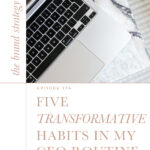

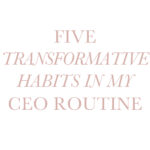
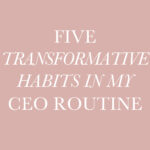
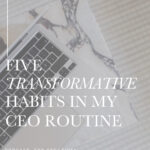

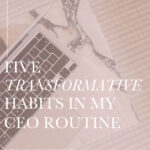
leave a comment